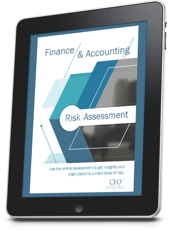
Imagine signing your company’s largest contract of the year with a new client. Sales staff celebrate bonuses, and production goes to work on deliverables. When final payment is due, however, the client defaults and won’t return your emails or calls. It doesn’t take long, or much effort, to learn that this isn’t an isolated incident with this customer.
Could you have prevented this costly mistake by performing due diligence on that prospective client before signing on the dotted line? What are the benefits and risks of integrating this practice into your business process? And if you do, how would you go about conducting due diligence on prospective clients?
The Client Due Diligence Conundrum
In our personal lives, it’s increasingly common to perform due diligence on everything from a prospective employer to where to go on vacation to a new refrigerator purchase. Some involve more financial risk than others, but it makes sense to do some research when there’s money on the line. When it comes to your business, knowing who you’re working with might be a matter of both money and reputation. But it’s more complicated than that.
Customer due diligence is a controversial topic among service providers. Some business owners believe that due diligence is a vital step for onboarding new professional service clients, while others intentionally strive to eliminate any entry barriers that would discourage potential clients. Both groups tend to have strongly held opinions about the validity of their positions and often struggle to see the topic of due diligence from the other’s perspective.
Business owners that are opposed to doing due diligence on customers are typically concerned with losing new business prospects from the pipeline and thwarting future deals with the negative brand perception that can result. They argue that by having more clients, they are increasing the size of their revenue pie, which results in more profitability even if they lose a larger slice of that pie to poor payers and fraudsters.
However, proponents of due diligence argue that having a bigger slice of a smaller revenue pie is better for business profitability because it improves operational efficiency and employee morale. They contend that having fewer, better-quality clients will generate more long-term profit because companies will need to spend less time on escalations, conflict resolution, collections, and payment disputes, which substantially reduces business expenses.
Due Diligence for Service Providers
Engaging in new business relationships can be risky, but the right answer might depend on your situation. Due diligence measures that are too strict may needlessly eliminate lucrative deals. But overly lax business practices can result in cash flow shortages, legal entanglements, and even bankruptcy.
Professional service providers are especially apt to enact due diligence procedures to maintain profitability because, once a service is performed, it can't be undone. Unlike a goods provider, which can demand that items be returned, or a software provider, that can turn off access to a platform, a service provider has little recourse after work has been done for a client, other than taking lengthy legal action to demand restitution.
The owners of professional service companies often ask:
- Do businesses really need to perform due diligence on prospective clients?
- What are the benefits (and the risks) of implementing due diligence procedures?
- What are some best practices for performing due diligence?
- Which considerations should business owners be aware of when conducting due diligence?
- Do the benefits of doing due diligence outweigh the risks?
Effective due diligence can lay a client acquisition foundation that protects the business while promoting sustainable growth through improved profitability. However, understanding what to expect as well as the tradeoff between risks and benefits is crucial in implementing these types of due diligence procedures.
The Business Case for Performing Due Diligence
Get a group of entrepreneurs in a room, and there’s a good chance that several of them have been the victims of fraud. According to the Association of Certified Fraud Examiners (ACFE), nearly half of all small businesses experience fraud at some point. While some losses originate internally, other cases involve prospective or current clients.
The ACFE reports that the average business loses 5% of its revenue each year to fraud. Beyond this, 22% of the cases that the agency examined involved losses of $1 million or more.
In the financial sector, due diligence is now mandatory. It’s termed Customer Due Diligence (CDD) or Know Your Customer (KYC). These policies are in place to protect companies against the growing threat of money laundering from a range of criminal enterprises, as well as the potential funding of terrorism.
No business wants to be involved in a money-laundering scheme or unwittingly funneling money to terrorists, but there are less charismatic ways to get swindled by a client. For example, a customer can pay for services with a phony cashier’s or certified check, and then move on before you know about the fraud. Or, they might pay promptly for services from a supplier that they can use as a reference for a larger order. Then, once a major order is placed on credit, the customer can’t or won’t make payment.
You want to trust your clients because you want the business, but not all customers are trustworthy. So, what are some of the benefits and risks of checking them out before you finalize the deal?
Benefits of Performing Due Diligence
The biggest benefit of conducting due diligence is increased profitability. A higher propensity to get paid means that more of the business’s activities will be generating collectible revenue. However, there are many more benefits as well:
Strengthened Customer Relationships
Investigating potential clients’ business practices before bringing them on increases the likelihood of working with other like-minded companies. The resulting ideological match creates a collaborative synergy that is likely to strengthen these working relationships, increase overall customer satisfaction, and improve customer retention.
Increased Business Morale
When employees can do the jobs they were hired to do instead of chasing payments or following up on delinquent accounts, they will be more satisfied with the work they are doing. Allowing them the freedom to utilize their core competencies elicits more pride in their work and confidence in the future of the business. Increased workplace morale drives a company culture that facilitates the recruitment of top talent and encourages greater employee retention.
Established Legal Protections
Being able to prove that due diligence work was done before bringing on a client that is engaged in illegal practices is crucial for establishing legal protections, which is why financial institutions are required to do so. Otherwise, service providers can be implicated in illegal activity that they were not involved in and may not have even known was occurring.
Improved Brand Integrity
When unethical, but not necessarily illegal, activity is occurring, the court of public opinion will be far more forgiving if the business took the initiative to screen clients beforehand, preserving brand perception. Consumers are more likely to come to a company’s defense if they have a portfolio of upstanding clients and one nefarious exception than a whole lineup of dubious or disreputable clients.
While these benefits may not be strictly monetary in nature, they ultimately affect a business’s bottom line as well, reinforcing the concept that due diligence has significant, broad-reaching financial implications.
What About the Risks?
While there are risks associated with conducting due diligence on prospective clients, there is a much greater risk when not doing so.
Smaller Client Base
Probing into potential clients’ backgrounds before doing business with them carries the risk of scaring off clients that value their privacy and do not want to invite in extra scrutiny. Even among consenting prospects, those that do not have the time to wait for approval will have to look elsewhere.
For these reasons, due diligence will always result in some business casualties. Within the remaining pool of potential customers, some will inevitably be excluded from business deals due to the findings in due diligence proceedings.
The aggregate effect of these realities is a smaller overall client base. Therefore, the inherent risk associated with doing due diligence is a constriction of the sales lead pipeline. However, the risk of lost sales is minimal compared to the greater business risk of not engaging in comprehensive due diligence practices.
Financial Risks
Short-term cash flow and long-term profitability can suffer significantly when client accounts are uncollectable. Costs in the form of cumulative labor hours, products, or materials used in doing work, and the opportunity cost of not taking on additional clients are difficult to recoup.
These costs may also be challenging to accurately monetize, which poses a problem when taking legal action against unpaying clients because a judge may not be willing to award the full extent of lost revenue.
Without due diligence, other risks include increased customer turnover rates and reduced average customer lifetime value. These also result in substantial profitability damage that is hard to recover. These types of systemic issues necessitate organizational changes to reverse the trend of premature client turnover.
Best Practices for Due Diligence on Prospective Clients
Whether a customer means to cheat your company, or they are just a poor risk, you have the right to protect your business interests and financial assets. You can do this by establishing and following protocols for due diligence.
Before you finalize a contract with a prospective client, you should obtain independent verification of the information they provide. Here are a few best practices you can follow for due diligence:
Identity Verification
At the most basic level, it’s a good idea to independently verify the customer’s identity. You can ask them for a copy of a government ID for your records.
If the prospect is a business, look up the company on the online Secretary of State registry to determine who really owns it. Find out all you can about the principals and see if any complaints have been filed against the business.
Credit Check
You can run a credit check on a client, a business, or its principals, but you shouldn’t rely on this alone as your due diligence. According to a study released in the Wall Street Journal, up to 25% of business credit reports are missing key information or contain errors, and the FTC says that one in five consumer credit reports have errors.
A credit score is supposed to rank the creditworthiness of a person or business. It’s a good starting point and might point out some glaring issues. The same holds true for a credit report that could list past delinquencies, judgments, or bankruptcies.
Credit References
If you’re extending credit to a client, they might list some references on an application. Too many businesses assume that these are legitimate and don’t scrutinize them closely enough.
Use an independent company to dig into these references a bit deeper. Alternatively, look up names and phone numbers independently to avoid calling “fake” references. And make sure that the reference makes sense for the type of client you’re engaging.
Business, Industry & Trade Groups
Participating in various industry, trade, and local commerce groups is good for business. But doing this has another benefit when it comes to due diligence.
If you meet a client that is a poor credit risk or is simply out to steal your products or services, there’s a good chance this isn’t their first rodeo. When you participate in a strong business and industry network, you’re more likely to hear about bad actors and can likewise warn your colleagues when you discover one.
Financial Statements
Depending on the relationship you’re about to form, you might ask to see a copy of a business client’s financial statements. Instead of just looking at the cash figure or bottom line, search out items that might be questionable.
-
- Are the assets inflated or impossible to confirm?
- Do the statements have a random date instead of the end of a month or quarter?
- Can you verify the credentials of the person that prepared the statements?
How many of these best practices you decide to follow will depend on the nature of your business and the size of the potential risk.
Additional Considerations When Implementing Due Diligence
When business owners decide to forgo due diligence on new clients, it is typically a result of time constraints, budget restrictions, or concerns over the difficulty of doing so effectively. Each of these considerations can be a barrier to implementing due diligence measures.
While there will always be costs associated with running credit checks or background checks, the time needed to do due diligence can be reduced over time as companies get more accustomed to these practices and become more efficient at collecting, reporting, and communicating necessary information. Similarly, the difficulty of conducting due diligence is minimized over time as employees become more comfortable with the process.
Furthermore, fostering timely communication and transparency throughout the process can help reduce friction that can be off-putting to potential clients going through the approval process. When potential customers are informed of requirements, kept abreast of status updates, given expected turnaround times, and notified of delays, they are less likely to look elsewhere for another solution while waiting for approval. The result is reduced leakage from the sales pipeline.
Is It Essential to Perform Due Diligence on Clients?
Running a business difficult enough when everything goes as planned. But, often, the unexpected happens, and this can include fraud or nonpayment from clients. While some fraud is as small as a few hundred dollars, other losses can be so severe that they force you to close your doors.
While there are arguments both for and against, due diligence is an essential best practice that benefits businesses over the long term.
As Benjamin Franklin once said,
“An ounce of prevention is worth of pound of cure.”
Having a thoughtful system of due diligence in place can save your business some tremendous headaches and protect your financial assets. These procedures also can help strengthen your brand when clients understand your motives for being selective.
If you are interested in better risk management, you are welcome to use our free risk assessment.
 A financial risk assessment can make all the difference for your business. Preparing to take advantage of opportunities and eliminate potential landmines makes good business sense.
A financial risk assessment can make all the difference for your business. Preparing to take advantage of opportunities and eliminate potential landmines makes good business sense.
Get instant access to our free finance and accounting risk assessment!
Contact CFO Selections® now with any questions about our services.
About the Author
 Sheri Ferguson is a founding partner of Accounting Solutions Partners, LLC which has been providing accounting and bookkeeping services to small and midsize companies since 2006. She has served on the board of CFOS Foundation since 2010 and has been a partner at CFO Selections, LLC since 2013.
Sheri Ferguson is a founding partner of Accounting Solutions Partners, LLC which has been providing accounting and bookkeeping services to small and midsize companies since 2006. She has served on the board of CFOS Foundation since 2010 and has been a partner at CFO Selections, LLC since 2013.
Sheri has over thirty years of experience in accounting and financial services. She has successfully owned and managed three accounting services companies in both eastern and western Washington. Accounting Solutions Partner’s team of over 80 professionals has many satisfied clients in multiple industries including professional services, start-up technology, e-commerce, construction, non-profit, and healthcare.






